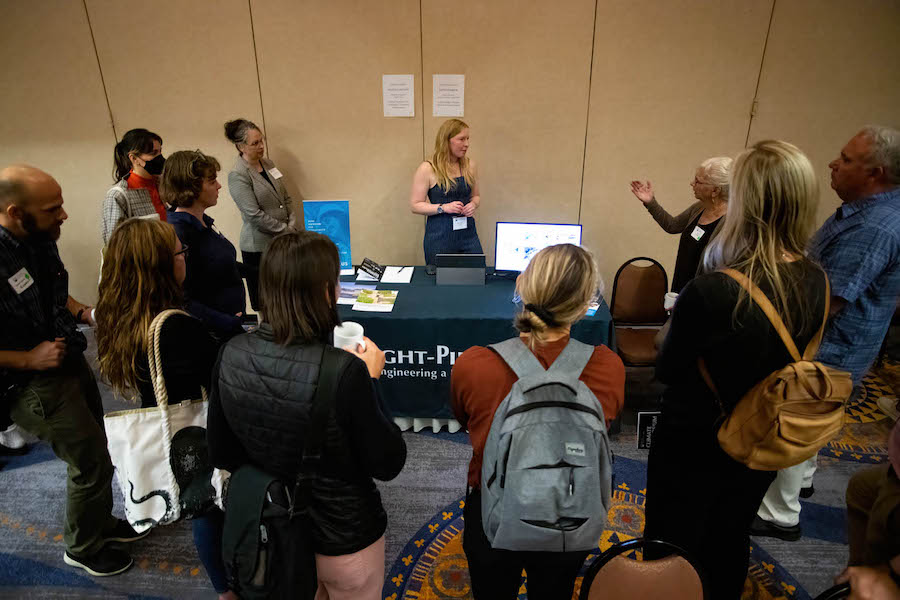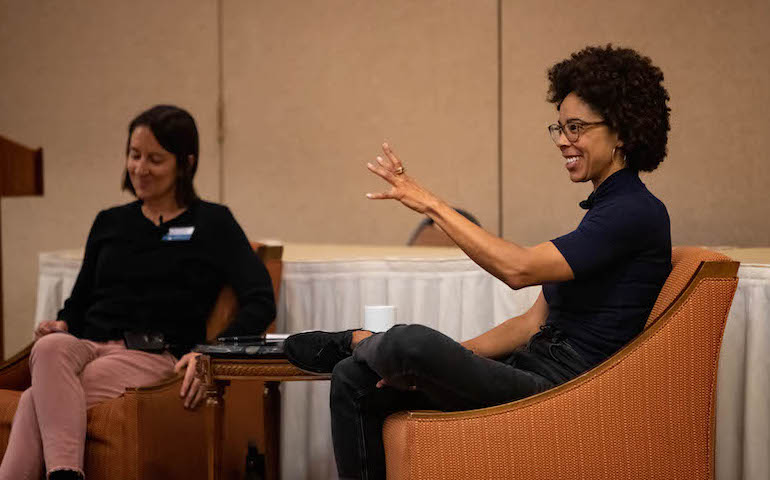With hurricane season hitting our southern neighbors earlier than usual, the impacts of climate change were top-of-mind entering the Island Institute’s Climate Symposium on Friday, September 16th. Over 140 mostly Mainers gathered in Portland to share solutions, ideas, and methods for businesses and communities to adopt or trial in this changing climate.

In a non-conventional conference style, presenters were stationed around the space with only 15 minutes to present to each group traveling clockwise around the room—speed dating for climate solutions. This unique format allowed for an extended dialogue between presenters and attendees. Two themes: community planning and working waterfront solutions, permeated the conversations, resonating with the core work of the Island Institute. Presenters’ voices could be heard sharing out their innovation, planning methodology, or research. Island Fellow Paige Atkinson’s clear and melodic voice talking about Eastport’s microgrid and their community process mixed with General Manager of Casco Bay Lines Hank Berg’s consistent cadence walking his group through the various hurdles and successes Casco Bay Island Transit District has had on their journey working to electrify the ferry fleet. Making my way around to each presentation, it was hard not to overhear snippets from the upcoming group and get excited about what I was going to hear next.
The strong itch to connect in one-on-one conversations made for a lively lunch break with participants and presenters alike launching into shared insights, knowledge, and contact information. So engrossed in conversation, it was a challenge getting them back up the stairs for the second session, which included a presentation on solar processing options for oyster farmers by Max Burtis of Ferda Farms while Ruth Indrick, the Project Director, Kennebec Estuary Land Trust, discussed with groups how a marsh restoration and road protection project in Georgetown has federal, state, town entities as well as a regional land trust collaborating.In total, 17 presenters shared 14 inventive coastal climate solutions. One participant remarked, “The tone of the day was very positive—an approach to climate challenges with creativity and opportunity at the grassroots level.”
For the final part of the symposium, we welcomed additional members of the public for a screening of our new Climate of Change film, Clean Energy Solutions for the Working Waterfront. The film focused on three businesses: Luke’s Lobster, Community Shellfish, and Maine Electric boat, which are all taking active steps to reduce their reliance and use of fossil fuels. The panel discussion included leaders from the companies featured in the film: Ben Conniff, Boe Marsh, and Matt Tarpey. Moderated by the Island Institute’s Emma Wendt, the panelists shared how clean energy can help ensure the longevity of their industries and create a better future for the next generation.
Wrapping up the day, Island Institute’s Marine Scientist Susie Arnold facilitated a conversation with Dr. Ayana Johnson. In a realistic but humor-filled way, they made it clear to the audience that our only choice moving forward is often not the easy or economical choice if we want to realize a more livable and equitable planet. Susie and Ayana, both marine scientists, talked about the changes in fisheries globally, how we must think long-term, and that tradeoffs are necessary to realize a vibrant future.

Ayana and Susie’s conversation was full of hope and helped us imagine a more livable and equitable planet. A future that is achievable if leaders, organizations, and individuals have a clear picture of what is possible. As Ayana explained, “We don’t have enough visions and popular culture for what if we get it right. What if we charge ahead with all the climate solutions we have like electric boats and solar panels and regenerative farming and all of the things we already know how to do? It’s just a matter of how fast we’re going to implement them. If we have better visions of what Maine would look like if it were 100% renewables—what it would really feel like, I think that would be more motivating. You can run towards something you can really see.”
Thanks to everyone who joined us at this inaugural event. We look forward to continuing to work with communities here in Maine to implement solutions and chart a clear course towards a climate-resilient future.

